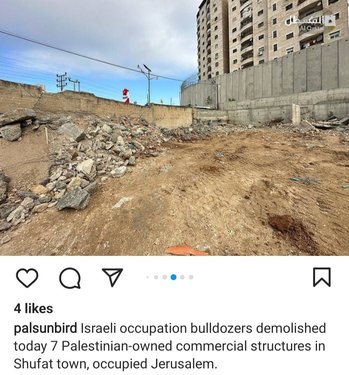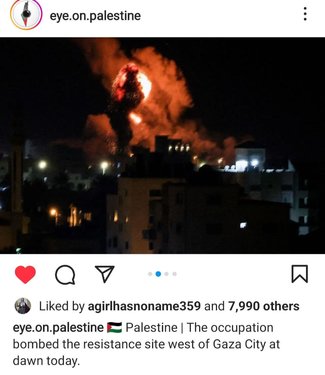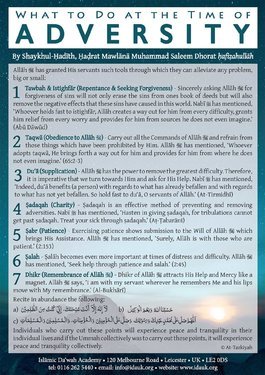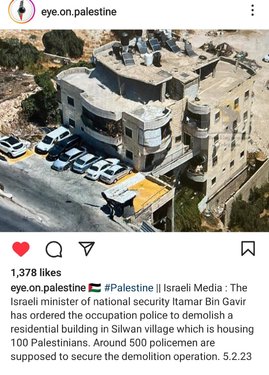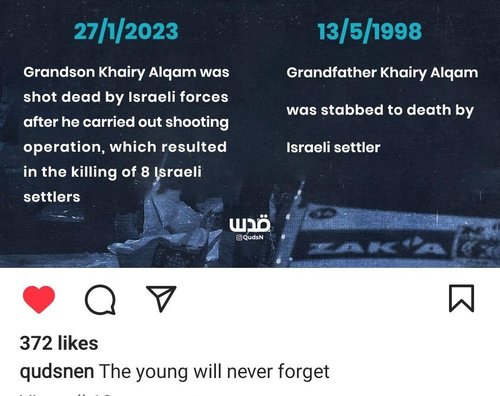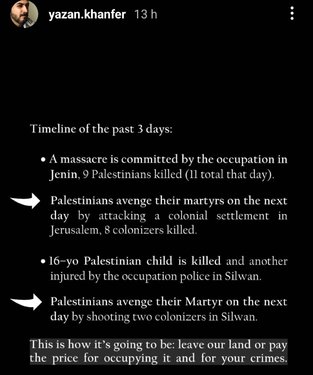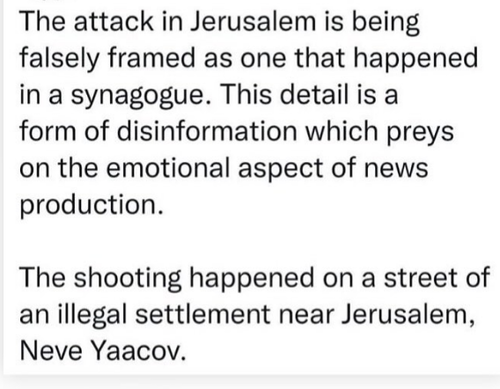-
Posts
8,465 -
Joined
-
Days Won
773
Content Type
Profiles
Forums
Events
Everything posted by ummtaalib
-
Q. Is one allowed to use the money of the deceased to pay for the food that is given on the funeral day? If one comes to know that the food was paid for using the money of the deceased, is one allowed to consume this food? (Question published as received) A. The wealth of the deceased person may not be used to feed people at the home of the deceased. Such wealth forms part of their estate that has to be distributed to the rightful heirs. However, if all the heirs are mature and they mutually agree to feed the people using the estate money, then it will be permitted, otherwise not. It is important to note that the Islamic teaching in this regard is not to burden the grieving family to prepare food for visitors. Rather, Islam encourages the community to provide for the family to lessen the burden of their grief. Sayyidatuna Asma bint Umais Radhiyallahu Anha reports, “When Ja’far (Radiallahu Anhu) was martyred, the Messenger of Allah Sallallahu Alaihi wa Sallam went to his (own) family and said: ‘The family of Ja’far are consumed with the matter of their deceased, so prepare food for them.’” (Ibn Majah 1611) And Allah Ta’ala Knows Best Mufti Moosa Salie Mufti Taahir Hansa (The answer hereby given is specifically based on the question asked and should be read together with the question asked. Islamic rulings on this Q&A newsletter are answered in accordance to the Hanafi Fiqh unless otherwise stated.) Fatwa Department Jamiatul Ulama (KZN) Council of Muslim Theologians
-
We live in a world of import and export, a world in which most goods and commodities are available in most countries for most of the year. However, despite the year-round availability, there are many goods that enjoy a ‘peak season’. Astute businessmen are those who identify this period and utilize it to their advantage. A Golden Opportunity The season presents a golden opportunity for one to secure tremendous profits in a minimal period of time. Hence, during the month of December, even if the rest of the world is on vacation, it is practically unimaginable for one to find the serious businessman on holiday. He understands the pivotal role that the season plays in his success; if he remains focused and committed, he will reap the profits, and if he allows himself to become distracted or while away his time, he alone will suffer the consequences. The Season of Taqwa Just as other things have a special season; taqwa also has a special season – the month of Ramadaan. From fasting during the day to performing Taraaweeh during the night, the entire month has been specially designed to assist a believer in harvesting a bumper crop of fruit, from the tree of taqwa, which he will continue to enjoy long after the blessed month has expired. However, just as with other seasons, this will only be possible if one avails himself for this blessed month and expends all his energies in striving to secure the bargains it has on offer. More than Money If the shop owner arrives at work two hours late, he will regret the business that he lost and lament the money that he could have made. For every minute of the two hours, he could have been serving customers and turning the numbers. We often hear the adage ‘time is money’. However, contrary to popular belief, time is NOT money — it is far more valuable than money. Whereas money can always be later recovered if lost, time can never be recovered — and it is for this reason that time is our single greatest asset. In the race to secure the rewards of Ramadaan, it is those who are particular regarding their time that profit the most. Destructive Distractions In this regard, along with the ready-made opportunities to benefit are a host of ready-made distractions. After - Taraaweeh braais, meeting friends for a chat, an ‘Eid bargain-hunting’ excursion – these are all seemingly innocent activities. However, when thoroughly scrutinized, we realize that the braai ‘burnt’ two or three hours of our time, whereas a normal supper would have been concluded in a maximum of thirty minutes. The excursion to purchase ‘Eid-goods at the best prices may have saved us a few valuable rands but undoubtedly cost us invaluable hours and minutes. Media ‘Mania’ In the opinion of many, the uncrowned yet undisputed champion of ‘killing time’ is social media in all its various guises and forms. Whether in the masjid, while attending a program for spiritual upliftment, or at the time of sehri when du‘aas are accepted – instead of maximizing and benefiting from these opportunities, there are many who become Media ‘Maniacs’ and wile away the irrecoverable moments on their smart phones. For this purpose, just as we fast by shunning food and drink from dawn to sunset, let us make a resolution to ‘fast’ from all forms of media for all the 24 hours of every day in the Month of Ramadhan. We should initiate a complete ’fast’ from all these time-consumers during this blessed period and afterwards as well. Thus let us make this Ramadaan very profitable by correctly investing the capital of time that we have been blessed with. Insha-Allah we will reap the rewards in this world and the Hereafter. alhaadi.org.za
-
-
ach year we are reminded that this Ramaḍān may be our final one. We also often remember those who were here last year but have passed on to Allah (subḥānahū wa ta‘ālā) since then. Amidst the hustle and bustle of everyday life, Ramaḍān, by the will of Allah, is the lifeline we desperately need: patience through fasting, tranquillity through the night prayer, purification through repentance, comfort through du‘ā’ and contentment through dhikr. For this Ramaḍān to be our best, we should start preparing now, spiritually but also physically. By preparing in Shaʿbān, we are more likely to taste the sweetness of fasting and qiyām in Ramaḍān inshāAllah. The following are some of the ways in which we can prepare for this momentous month: 1. Start fasting, especially if you have qada fasts ʿĀ’ishah (raḍiy Allāhu ʿanhā) said: “I did not see him ﷺ fast in any month as much as he fasted in Shaʿbān.” (Muslim) Usāmah b. Zayd (raḍiy Allāhu ʿanhumā) said to the Messenger of Allah ﷺ, “O Messenger of Allah, I do not see you fasting in any month as much as you fast in Shaʿbān.” He ﷺ said, “That is a month which people do not pay much attention to, between Rajab and Ramaḍān. It is a month in which the actions are taken up to the Lord of the worlds, and I like that my deeds are taken up whilst I am fasting.” (Nasā’ī) Just as performing the sunnah prayers before the farḍ prayers awakens the heart, prepares you to enter the farḍ prayers with greater khushūʿ, and compensates for the deficiencies of the farḍ prayers, fasting before Ramaḍān prepares you for Ramaḍān physically and spiritually. Ibn Rajab (raḥimahullāh) wrote, “As Shaʿbān is a prelude to Ramaḍān, fasting and reciting Qur’ān has been prescribed in it just as it has been prescribed in Ramaḍān. This is so that you are prepared to enter Ramaḍān and you train yourself to perform acts of obedience.” By becoming accustomed to fasting in Shaʿbān, fasting in Ramaḍān will be easier. Similarly, experiencing the sweetness of fasting in Shaʿbān will help you to fast Ramaḍān with greater enthusiasm. If you have any outstanding fasts from last Ramaḍān, use this month to make them up (qaḍā). 2. Increase in your recitation of the Qur’an Ibn Rajab (raḥimahullāh) wrote, “The predecessors used to devote themselves to the recitation of the Qur’ān in Shaʿbān, and they would say ‘The month of Shaʿbān is the month of the Reciters.’” Set a realistic – yet slightly ambitious – target for recitation for this month to ensure you have a smoother entry into Ramaḍān. It may be increasing your recitation by 5 minutes or even an extra hour. Whether you increase the amount of time or the number of pages, either way increase on what you usually do. 3. Start praying at night If waking up for tahajjud before Fajr is difficult, pray a minimum of 2 rakʿahs in addition to what you usually pray for ʿIshā’ before you go to sleep. 4. Give charity Our beloved Prophet ﷺ said, “Whoever provides ifṭār for a fasting person, he will have the same reward as him, without anything being diminished from the reward of the fasting person.” (Tirmidhī) Give charity in Shaʿbān, so that the poor can gain energy to fast Ramaḍān and perform qiyām, as our predecessors used to do. An additional benefit is that if you donate ifṭār to the poor in other countries now, it is more likely to reach them at the beginning of Ramaḍān, allowing you to receive the reward of the full month. 5. Start reading/listening to something which will boost your iman Slowly start weaning yourself off what snatches your time away from Allah (Netflix/social media etc) and substitute it with what will remind you of Him. 6. Clear your heart As this is the month when your yearly actions are raised to Allah (subḥānahū wa ta‘ālā), cleanse your heart from hatred and grudges. Forgive people who have wronged you and start talking to people you haven’t talked to in a long time. The Messenger of Allah ﷺ said, “Indeed Allah looks down in the middle night of Shaʿbān and He forgives all of His creation, except anyone who commits shirk or harbours hatred.” (Ibn Mājah) 7. Hold yourself to account Our actions are raised up daily to Allah twice: in the morning and the evening. Then, they are raised up weekly to Allah twice: on Monday and Thursday. They are then, raised up to Allah yearly in Shaʿbān. Thus, the Prophet ﷺ liked for his ‘annual performance review’ to correspond with him being in a state of fasting. Use this month to evaluate your last year’s actions. Do as much ʿibādah as you can, so that the angels will ascend to Allah with your good deeds. 8. Purify yourself before Ramadan by seeking forgiveness Seek abundant forgiveness and turn to Allah in sincere repentance. Allah (subḥānahū wa taʿālā) says, “So seek your Lord’s forgiveness and turn to Him in repentance. Surely my Lord is Most Merciful, All-Loving.” (11:90) Purify your heart to welcome Ramaḍān in the best manner possible. Don’t let your sins prevent you from tasting the sweetness of worship in Ramaḍān. Wuhayb b. Ward (raḥimahullāh) was asked, “Can the sinner taste the sweetness of worship?” He said, “No, not even the one who considers doing the sin.” 9. Take the following physical steps: • Adjust your sleeping routine from now so that your body is adjusted by the time Ramadān begins. • Buy your Eid outfits and gifts now. If you are going to purchase new items this year, then do it now (in Shaʿbān) to avoid wasting precious time in Ramaḍān. • Make a plan for simple and nutritious iftar meals to avoid wasting time in the blessed month. • Plan how you are going to give your zakāh and ṣadaqah. 10. Draw up your Ramadan timetable Plan a Ramaḍān timetable. See the next article for tips on how to devise a successful plan. Revive A Neglected Sunnah Our beloved Messenger ﷺ described Shaʿbān as, “A month which people do not pay much attention to, between Rajab and Ramaḍān” (Nasā’ī). This indicates that many people are heedless of this time, and it is especially virtuous to worship and remember Allah in places and times of heedlessness, e.g. the markets. It also helps us to perform deeds in secret, as others are heedless, and thereby giving us a chance to increase in our sincerity (ikhlāṣ). Whilst we will all be fasting in Ramaḍān inshāAllah, this is our chance to fast in secret. May Allah allow us to revive the sunnah of increasing our worship in this month, and allow us to reach Ramaḍān. Source
-
The sighting of the Crescent of Sha’ban signals the good news of Ramadan’s imminent arrival. A believer grows in anticipation with the passing of each day. Days like these, are what a believer ‘lives for’. A Month for Rehearsal In addition to it being the most virtuous month - outside Ramadan - to fast, another reason for Nabi (sallallahu’alayhi wasallam) increasing his optional fast in Sha’ban was to prepare for Ramadan as well as to respectfully welcome Ramadan. (Lataiful Ma’arif, pg. 258) The Sahabah (radiyallahu ’anhum) and Tabi’un (rahimahumullah) would also engage in what we would understand as ‘spiritual preparation’ for Ramadan. Sayyiduna Anas (radiyallahu ’anhu) says: ‘When Sha’ban would commence, the Muslims (Sahabah and Tabi’un) would dedicate themselves to the recital of the Quran.’ (Lataiful Ma’arif, pg.258) Hafiz Ibn Rajab Al-Hambaly (rahimahullah) writes: ‘Since Sha’ban is a prelude to Ramadan, Islam encourages certain deeds in this month that are usually done in Ramadan like fasting and Quran recital. This prepares the soul to welcome Ramadan, with open arms.’ (Lataiful Ma’arif, pg.258) Another form of preparation In addition to the above deeds and their like, there is another form of preparation that is absolutely essential. That is to settle our disputes and cleanse the hearts from jealousy, rancour and I’ll-feelings. A Hadith in Sahih Ibn Hibban, mentions of four people that will be deprived on auspicious nights: a) An alcoholic b) One who disobeys his parents c) One who severs family ties d) One who harbours ill-feelings in his heart for others People who hold onto old grudges, and do not settle their disputes, nor cleanse their hearts are usually deprived on Allah’s mercy, even on blessed occasions. Therefore it is imperative for a believer, as part of his preparation for Ramadan, to sort out such issues ahead of time. 15th of Sha’ban (Laylatul Bara’ah) The beginning of Sha’ban is a time for us to reset our minds hearts and routines for Ramadan. Barely two weeks into the month, will bring the occasion of the fifteenth night of Sha’ban. This night is labelled as the second most auspicious night of the year, by some Scholars. (Lataiful Ma’arif, pg. 264) Allah Ta’ala, through His wisdom granted the Ummah this auspicious night as a prelude to Ramadan. On that night too, those who harbour ill-feelings are deprived of Allah’s Mercy and Forgiveness. Therefore, one should understand that today is an ideal time to reflect on the above and to make efforts to implement them too. Let’s increase our nafl ‘ibadah from today, so that when Ramadan does arrive, we are well rehearsed and ready to maximise our benefit therefrom. May Allah Ta’ala guide and inspire us all. Ameen. Laylatul Bara’ah will be after Maghrib on Tuesday night, 7th March in South Africa. Source: Al-Miftah Jamiatul Ulama (KZN) Council of Muslim Theologians
-
-
-
Several killed in Israeli raids on Syria’s Damascus: State media Syrian media say Israel fired missiles on Damascus’s Kafr Sousa neighbourhood, killing five and wounding 15. At least five people have been killed, 15 wounded and several residential buildings damaged in Israeli airstrikes on the Syrian capital Damascus, Syrian state media reported. The raids early on Sunday hit a building in central Damascus’s Kafr Sousa neighbourhood near a large, heavily guarded security complex close to Iranian installations, Reuters news agency said, citing witnesses. Loud explosions were heard over a central area of the capital around 12.30am (2130 GMT Saturday), and the Syrian Arab News Agency (SANA) reported that Syrian air defences were “confronting hostile targets in the sky around Damascus”. Citing a military source, SANA reported that five people had been killed, among them a soldier, along with “destruction of a number of residential buildings”. “It caused damage to several civilian homes and material damage to a number of neighbourhoods in Damascus and its vicinity,” the army said in a statement. Footage posted by state media showed that a 10-storey building was badly damaged in the attack, crushing the structure of its lower floors. “The strike on Sunday is the deadliest Israeli attack in the Syrian capital,” said Rami Abdel Rahman, head of the Syrian Observatory for Human Rights, a United Kingdom-based group that has a wide network of sources inside Syria. Israel has not commented on the airstrikes which come more than a month after an Israeli missile attack hit the Damascus International Airport, killing four people, including two soldiers. Full report: Al-Jazeera
-

What to do at the time of Natural Catastrophes
ummtaalib replied to ummtaalib's topic in General Islamic Articles
Our Responsibility during Calamities By Shaykhul-Hadīth, Hadrat Mawlānā Muhammad Saleem Dhorat dāmat barakātuhum When a person is afflicted with a calamity, catastrophe, grief etc., the people around him/her; the family, friends and the wider Muslim community, all have a role to play. We often remain neglectful and fail to fulfil our duties in this regard. I would like to mention a few points concerning this which will be of benefit inshā’allāh. 1. Feel for others The Sharī‘ah has advised us that we should realise and feel the pain the afflicted Muslim is going through. It is unfortunate that we have become very hard-hearted and do not feel the pain of others. Rasūlullāh sallallāhu ‘alayhi wa sallam has given much emphasis to brotherhood and having feeling for one-another, rather feeling for every living creature. Take a look at the beautiful teachings of Islām: Allāh ta‘ālā states in a verse mentioning the qualities of the Sahābah radhiyallāhu ‘anhum: In another verse, Allāh ta‘ālā instructs us regarding non-Muslims: Rasūlullāh sallallāhu ‘alayhi wa sallam has stated: 2. Give Support Together with realising the difficulties and pain the ones afflicted are undergoing, the Sharī‘ah has instructed us to give support and condolence. Rather than becoming bystanders, we should act positively. It is for this reason the instruction of ta‘ziyah (consoling) has been given. In one hadīth Rasūlullāh sallallāhu ‘alayhi wa sallam has stated: So, Rasūlullāh sallallāhu ‘alayhi wa sallam has encouraged us to console the one afflicted and the whole purpose of consoling is to give support and lessen the grief from the one afflicted. It is strange to note our adverse conduct in this regard that we, instead of offering supporting words, increase the grief and sorrow by our statements. We, in order to show we are very much grieved, say and do those things which act as salt on the wound. Lāhawla walā quwwata illā billāh! When consoling, we should give a positive outlook to the difficulty. A positive aspect to the matter works wonders in reducing the grief of the afflicted. If someone’s father has passed away, one can give a negative aspect to the issue and say, ‘What a great loss! Truly you have now lost a great person. How will you cope without him?’ etc. and one can also speak positively and say, ‘You were very fortunate that the cool shadow of your father remained over you for 40 years. There are so many people whose fathers have passed away in their childhood…’ It is narrated that after the demise of ‘Abbās radhiyallāhu ‘anhu, his son, Ibn ‘Abbās radhiyallāhu ‘anhu remarked, “No one consoled me better than the Bedouin.” The story is that a Bedouin came to console Ibn ‘Abbās radhiyallāhu ‘anhu and said the following couplets: اصبر نکن بك صابرین فإنما صبر الرعیة بعد صبر الرأس وخیر من العباس أجرك بعدہ والله خیر منك للعباس 3. Make du‘ā Making a du‘ā is one of the best ways to assist the one afflicted. Rasūlullāh sallallāhu ‘alayhi wa sallam has stated that from amongst the du‘ā that is most quickly accepted is the du‘ā of the absent person for another. (Abū Dāwūd) Du‘ā is the most powerful weapon a believer has. Rasūlullāh sallallāhu ‘alayhi wa sallam has stated, “Du ‘ā is a weapon of the believer…” (Al-Ḥākim) Our du‘ā should not be restricted to the affected. If such a calamity has occurred wherein there is some mischief from a person, then also make du‘ā of divine guidance for that person too. Our attitude should be to pray for the enemies instead of cursing and making inappropriate statements. To understand this, we only need to look into the sīrah of Rasūlullāh sallallāhu ‘alayhi wa sallam. Whilst returning from Tā’if, after having been persecuted by its people, Rasūlullāh sallallāhu ‘alayhi wa sallam made du‘ā for them instead of cursing them. 4. Take lesson and prepare Seeing another in a pitiful condition is an opportunity to learn a lesson. It was the Grace of Allāh ta‘ālā that we are not in their shoes, but Allāh ta‘ālā is All-Powerful. He can bring such adverse conditions upon us too; therefore, we should use such incidents to bring a positive change in our lives. One should reflect in the following ways: a. Look at the one afflicted and start to prepare for such times. We should always ask Allāh ta‘ālā for ‘āfiyah, however, as we have discussed previously, difficulties and hardships in this world are inevitable, hence we should mentally prepare ourselves so that we react correctly in such circumstances. We should embed in our minds that should I be afflicted, I will exercise patience and think positively, so that I may reap the rewards promised for patience. b. In preparation for such times, one needs to begin to rectify his life and make it one of taqwā, as this is the only tool which will allow a person through difficult circumstances. Allāh ta‘ālā states, “…Whoever creates the veil of taqwā between himself and the disobedience of Allāh ta‘ālā, Allāh ta‘ālā will bring forth a way out for him.” (65:2) c. When such catastrophes occur to close ones or to someone in our locality, the feeling of loss can be more easily perceived and lessons can be learnt. In a recent incident, in our locality, a whole family was lost out by a fire and only one member remained. It is not difficult to understand the extent of this loss and how the remaining individual must be feeling. Having realised the severity of this loss, one should reflect on the hadīth of Rasūlullāh sallallāhu ‘alayhi wa sallam that whoever misses the ‘Asr salāh, it is as if he has lost his whole family and wealth. (Muslim) This way it will become easy for us to realise the loss we are making daily and this realisation will encourage us to repent sincerely and submit to the Commands of Allāh ta‘ālā. 5. Think about the future When calamities strike they tend to be sudden. Those who are afflicted with a calamity and leave this world do not have the opportunity to decide in what state they wish to leave. If they leave in a good state, with Īmān and taqwā; they are fortunate. The same can be our state; death may come unannounced. We need to contemplate and ponder whether we are ready to face death if it was to strike suddenly without notice. Rasūlullāh sallallāhu ‘alayhi wa sallam has said, “Each person will be resurrected in the state he/she has died.” (Muslim) Therefore, we should immediately begin preparing for the inevitable and remain ready at all times. May Allāh ta‘ālā grant us all the tawfīq. Āmīn. © Riyādul Jannah (Vol. 22 No. 11, Nov 2013) -
Following is a reply to a question on an Ifta group (Mufti Muajul I. Chowdhury) on being asked about certain famous speakers with big following on social media. In the Name of Allaah, the Most Gracious, the Most Merciful. As-salaamu ‘alaykum wa-rahmatullaahi wa-barakaatuh. Imaam Muhammed ibn Sireen (Rahimahullaah) has advised[1]: إِنَّ هَذَا الْعِلْمَ دِينٌ، فَانْظُرُوا عَمَّنْ تَأْخُذُونَ دِينَكُمْ “Verily, this knowledge is Deen, so be cautious of whom you take your religion from.” (Muslim) The following guidelines will assist in determining an upright ‘Aalim (scholar) of Deen: He is from the Ahlus Sunnah Wal Jamaa’ah[2] in matters of ‘aqeedah and fiqh. He is a graduate of a celebrated and accepted Islaamic traditional institute. He does not violate the laws of Shari’ah[3], for example: the laws of hijaab and intermingling. His teachings and statements are in accordance to the Shari’ah. He does not engage in bid’ah[4]. He is recognized and approved by the righteous learned scholars. If any of the above guidelines are violated, then one should not follow such a person. You may conduct your own investigation regarding the above individuals and use the above guidelines to decide. You should also enquire from the local ‘Ulamaa about them based on the above guidelines. If any person falls short of any one of the above conditions, then one should respectfully avoid seeking guidance from such a person. And Allaah Ta’aala Knows Best. Muajul I. Chowdhury Read more at askimam.org/public/question_detail/41666
-
-
Our heartfelt du'a for the people of Turkey and Syria and all people suffereing in the world. Allah Almighty have mercy on the Ummah!
-
Turkey Earthquakes: Today, the 6 Feb 2023, is indeed a very sad day for the Muslim Ummah considering the devastating earthquakes that took place in Turkey early this morning. Turkey is very close to the heart of the Muslim Ummah as it was the capital of the Islamic Caliphate for many centuries. We know the great work that Turkey has done for the Muslim Ummah and especially the Haramain Shareefain. The epicentre of this earthquake was the city of Gaziantep. This city is very close to the Jamiat Ulama KZN, South Africa, as we have been working in this area since 2013 and presently as well in our Syrian Relief Projects. Such good and noble work has taken place from this city giving relief to the Syrian refugees living therein, and at the border of Turkey and Syria and within Syria itself. Our hearts go out to the people of Gaziantep and to all our colleagues in Turkey particularly in this area. Everything is in the control of Allah Ta’ala. There are many lessons for us to take from what we have seen that these conditions can come about at any time, and we have absolutely no control over them whatsoever. May Allah Ta’ala remove their difficulty, ease the condition for those who have suffered injuries and grant them Shifa Kamila. May He grant forgiveness and high stages in Jannah to those who have passed away and may He make it easy for them to rebuild what has been destroyed, Ameen Yaa Rabbal Aalameen. Ahmed Mahomedy For Jamiatul Ulama KZN International Syrian Relief Team
-
Ask Allah to Bless Your Day أَصْبَحْنَا وَأَصْبَحَ الْمُلْكُ لِلّٰهِ رَبِّ الْعَالَمِيْنَ ، اَللّٰهُمَّ إِنِّيْ أَسْأَلُكَ خَيْرَ هٰذَا الْيَوْمِ ، فَتْحَهُ وَنَصْرَهُ وَنُوْرَهُ وَبَرَكَتَهُ وَهُدَاهُ ، وَأَعُوْذُ بِكَ مِنْ شَرِّ مَا فِيْهِ وَشَرِّ مَا بَعْدَهُ We have entered the morning and at this very time the whole kingdom belongs to Allah, Lord of the Worlds. O Allah, I ask You for the goodness of this day: its victory, its help, its light, and its blessings and guidance. I seek Your protection from the evil that is in it and from the evil that follows it. Aṣbaḥnā wa aṣbaḥa-l-mulku li-llāhi Rabbi-l-ʿālamīn, Allāhumma innī as’aluka khayra hādha-l-yawm, fatḥahū wa naṣrahū wa nūrahū wa barakatahū wa hudāh, wa aʿūdhu bika min sharri mā fīhi wa sharri mā baʿdah. Abū Mālik al-Ashʿarī (raḍiy Allāhu ʿanhu) narrates that the Messenger of Allah ﷺ said: “When one of you enters the morning, they should say [the above]; and when they reach the evening, they should say the same.” (Abū Dāwūd 5084) Brief Commentary • “We have entered the morning” means we have entered another morning, covered in Your protection, O Allah; enveloped in Your blessings, occupied with Your remembrance, seeking help with Your Name, and only breathing and living through Your will and power. • We begin the duʿā’ by affirming that the kingdom belongs to Allah, therefore He is the true King who has ownership over everything. The knowledge of this increases the awe and veneration we have for Allah. • After affirming the kingdom belonging to Allah, we mention what He does with His Kingdom: He looks after it. We describe Allah as being “Lord of the worlds” i.e. all that exists. When we say Allah is the Lord, we mean He is the one who looks after, nurtures and provides, therefore we should be grateful for Allah as He is the Lord of all that exists. • Once we realise that Allah is the one who provides for us and looks after us in the general sense, we begin to ask Him for specific things that we want from this morning or evening. • The first thing we ask Allah, is that we ask Him for the “goodness of this day/night.” We do not specify what good we want; therefore, we are asking Allah for all the good that there is. This includes the good with regards to this life (e.g. good health, security, peace of mind); and more importantly, the good with regards to the hereafter (e.g. praying the night prayer, reciting the Qur’an). • We ask Allah for “victory” and “help”. The victory here is both a physical and spiritual one, so we are asking Him for His help to allow us to be victorious against our enemies, shayṭān, as well as against our own nafs (inner self). • The “light” of the day refers to the light of guidance and īmān, which is present in the heart of the believer. It also refers to beneficial knowledge and righteous actions. • When Allah places His blessings on a matter, it will bear much more fruit than a matter which is not blessed. Therefore, when we ask Allah for the “blessings” of this day, we are asking Him to bless everything we have and do on this day, such as: our time, food, sleep and wealth. We are asking Allah to facilitate a pure and lawful income. More importantly, we are asking Him to bless our acts of worship, and cause them to be a means of further good in all aspects of our lives and the hereafter. • The last specific thing we ask Allah in this duʿā’, is to grant us the goodness of this day in terms of the “guidance” we receive. We are asking Allah to increase us in guidance, and to grant us steadfastness on it. • We finish off the duʿā’ by seeking refuge in Allah from all the evil that exists on this day, as well as all the evil that exists after it. This includes evil in terms of matters that may affect us in the world (e.g. harm, injury) as well as those that affect us in the hereafter (e.g. sins and transgressions against Allah). Action Points • True kingdom belongs to Allah alone. All the leaders and kings in this life all fall within the kingdom and dominion of Allah. This should remove the fear of worldly kings, authorities and leaders from our hearts; and make us realise that we have the King of kings by our sides. • We are asking for ‘opening’ in knowledge, guidance, sustenance, and all good. It also includes the ‘opening’ (i.e. removal) of grief, sorrow and all complicated matters. • When asking Allah for victory, do not just think about victory against the visible enemies. Focus also on your hidden enemies that could cause a greater destruction to your hereafter, such as Shayṭān, and your own nafs. • Always ask Allah to bless all your matters. Someone may sleep for 4 hours and feel very refreshed and energetic for the remainder of the day, whereas someone may sleep for over 8 hours, yet does not have much energy during the day. This is due to the blessings Allah had placed on the former, and the lack of it in the latter. • A means of securing blessings is to wake up early in the morning, as the Prophet ﷺ prayed for the mornings of his ummah to be blessed. • Making this duʿā’ in the morning is an indication that the true believer does not sleep or be heedless of his Creator at this precious time, as the morning is when the sustenance is distributed. Asking for ‘guidance’ is one of the most important duʿās we can make, hence why we seek guidance at least 17 times a day in Sūrah al-Fātiḥah. We should never underestimate the danger of slipping off the path of guidance (the straight path), and should always ask Allah to grant us steadfastness. lifewithallah
-
By Shaykhul-Hadīth, Hadrat Mawlānā Muhammad Saleem Dhorat dāmat barakātuhum Who is the Clever One? Rasūlullāh sallallāhu ‘alayhi wa sallam said: A Sahābī once asked Rasūlullāh sallallāhu ‘alayhi wa sallam, ‘Who is the cleverest and most far-sighted of the people, O Rasūlullāh?’ Rasūlullāh sallallāhu ‘alayhi wa sallam replied: Temporary World Such people are the clever ones because they prepare for the life which is eternal and everlasting. To help us better comprehend this, Imām Ghazālī rahimahullāh presents a striking example. He says, ‘If the whole world was filled with corn or chickpea seeds, and a bird was to take one seed after a million years, then another seed after another million years, and it continued to take one seed after every million years in this manner, then a time will come when the seeds will all finish, but the Hereafter will not end; it is everlasting.’ Allāh ta‘ālā is Al-Bāqī (The Eternal); He will never perish. Since Allāh ta‘ālā is Eternal, anything we carry out for His Pleasure also becomes eternal, i.e. its reward will be everlasting. Anything associated to us and this world will perish; and anything associated to Allāh ta‘ālā or the Ākhirah will remain forever. Allāh ta‘ālā states: The paltry benefits of this world are nothing in comparison to the life Hereafter, both in quality and quantity. Allāh ta‘ālā states: Pleasures of the Dunyā We should not let the superficial pleasures and enjoyment of this world deceive us and deprive us from the everlasting pleasures of the Hereafter. Every unlawful enjoyment brings with it pain and grief in this world and more in the Hereafter. Due to weakness in our Īmān, we sometimes become envious of the lavish lives of those who freely disobey Allāh ta‘ālā, and stare with desirous eyes at what they have. What we fail to realise is that we only see them when they are in the public sector, where every person feels the need to project a much decorated and glamourous image of himself. What is hidden behind their smile is known only to them and Allāh ta‘ālā. We do not see what they are going through behind closed doors, during the night or when alone. Similarly, we do not know what is to happen to them in the near future or when they reach old age. Peace and tranquility are taken away from such people and they face much hardship in this very world, and in the Hereafter the fire of Jahannam awaits them. Allāh ta‘ālā states in the Glorious Qur’ān: Despite having all the recourses of pleasure, they are restless and find no peace at heart because true peace and contentment are directly from Allāh ta‘ālā and come only through His remembrance and obedience to Him. Allāh ta‘ālā states in the Glorious Qur’ān: Those who obey Allāh ta‘ālā are granted peace and traquility in this world before the everlasting success of the Hereafter. Allāh ta‘ālā states: Thus, those who choose the dunyā and make it their sole objective suffer in this world and the next, whilst those who give preference to the Ākhirah by obeying Allāh ta‘ālā and restraining their nafs from unlawful pleasures receive the best of both worlds. They enjoy true peace in this world, and the everlasting and unimaginable pleasures of the Hereafter. Allāh ta‘ālā says in a Hadīth Qudsī: Two Choices We now have two choices. The first choice is that we freely follow our unlawful desires and 'enjoy' the so-called pleasures of this world at the cost of our Hereafter. The second choice is that we sacrifice the paltry unlawful pleasures of this world in order to secure the everlasting bliss of the Hereafter. Which choice will a person of average intellect opt for? Muftī Muhammad Shafī‘ ‘Uthmānī rahimahullāh who was an ‘Ālim of a very high repute, the author of the well-known tafsīr, Ma‘āriful-Qur’ān, gives a beautiful example to help us understand this choice better. He says, ‘A person is given the choice between two houses; a luxurious palace with all comforts and facilities and a small home with lack of facilities. Then he is told that the palace will remain in his possession for a duration of ten years after which one will have to vacate, whilst the small home is for him to keep permanently. Which of the two will an intellectual person opt for? Surely an intellectual person will understand that choosing the palace will leave him homeless after ten years, whilst the small home despite being far less comfortable will become a permanent residence for him, his wife and his children. Thus, he will give preference to the smaller home.’ It is worth noting that in this example the temporary abode is far better in quality and comfort than the permanent abode, yet a person will still choose the latter. If a person prefers the small home despite having far less facilities and comforts for the sole reason that it is a permanent abode, then why would the faculty of intellect not guide a person to give preference to the Ākhirah which is permanent and far better too? Will Life become Dry? Giving preference to the Ākhirah is not to say that our lives will become dry and that we will enjoy no pleasure in the worldly life at all. No. One will continue to enjoy his life by benefitting from the scores of lawful pleasures Allāh ta‘ālā has created. What Allāh ta‘ālā has made permissible is far more in number than what Allāh ta‘ālā has made impermissible. From the items available to eat, the halāl far outweigh the harām. From the things we can wear, see, hear and touch, the halāl are far more than the harām. Thus, a pious Muslim is not deprived of pleasure. We are only asked to refrain from the utterly greedy act of indulging in harām even after Allāh ta‘ālā has granted us so many halāl ways to enjoy. May Allāh ta‘ālā grant us the tawfīq to make the right choice and give preference to the Ākhirah over this dunyā, and as a result, enjoy a tranquil worldly life and acquire the eternal success and pleasure of the Ākhirah. Āmīn. © Riyādul Jannah (Vol. 31 No. 1, Jan 2022)

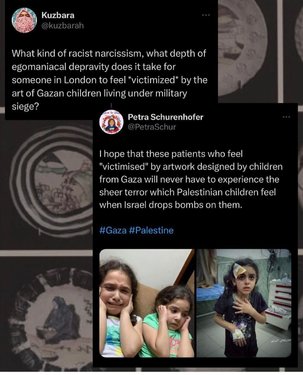
.thumb.jpg.8f40eb7bba7c507774fc85b07ad4e2c4.jpg)
.thumb.jpg.3f91379b6a55b7ebad15c0d9a7e6d206.jpg)
.thumb.jpg.62aeacd0372d3dcfa8013990aa4d895b.jpg)
.thumb.jpg.22c4b22daea0188b88c4930eb2b34836.jpg)
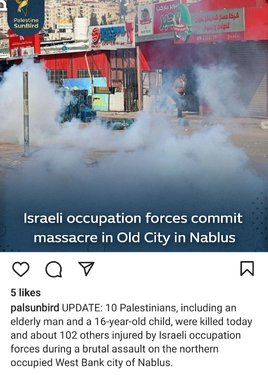
.thumb.jpg.9197d4950f831b86bab3c50e4681d068.jpg)
.thumb.jpg.20dce5f89d2ec7bfa66f363ef45a2d6d.jpg)
.thumb.jpg.b286bac85bf0e26e0858db876c11893d.jpg)
.thumb.jpg.2af475d32afceda24959361e0f870fdd.jpg)
